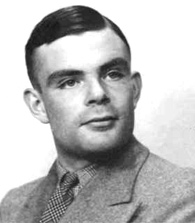"A posthumous pardon was not considered appropriate as Alan Turing was properly convicted of what at the time was a criminal offence," the BBC reported Justice Minister Lord McNally as saying when the motion was dismissed in the House of Lords last week.


Regarded by many as the father of computing, the English mathematician and computer scientist (23 June 1912 – 7 June 1954) was best known for his role in formalising the basics of computer science before he was arrested and eventually convicted for “gross indecency” in 1952.
That year, while reporting a break-in attempt on his house to police, Turing acknowledged a sexual relationship with another man and was charged with gross indecency as homosexual acts were illegal at the time in Britain. He underwent a hormone injection programme (chemical castration) as an alternative to a prison sentence. He was also stripped of his security clearance and was unable to work on secret government projects.
Before his arrest, he was a key member of the team that cracked Germany’s Enigma code during the Second World War and later helped formalise the concepts of “algorithm” and “computation” which were vital to the development of computer science.
He soon spiralled into depression and ultimately took his own life two years later, in 1954.
The latest online petition is different from the successful petition two years ago that called on the British Government to apologise for its persecution of Alan Turing. Former Prime Minister Gordon Brown formally apologised in September 2009, describing Turing's treatment as "horrifying" and "utterly unfair" as well as praising Turing's outstanding contribution to the war effort.
According to the Hansard transcript available online, Lord McNally stated that the government considered a posthumous pardon in 2009, adding: "A posthumous pardon was not considered appropriate as Alan Turing was properly convicted of what at the time was a criminal offence. He would have known that his offence was against the law and that he would be prosecuted."
He continued: "It is tragic that Alan Turing was convicted of an offence which now seems both cruel and absurd – particularly poignant given his outstanding contribution to the war effort. However, the law at the time required a prosecution and, as such, long-standing policy has been to accept that such convictions took place and, rather than trying to alter the historical context and to put right what cannot be put right, ensure instead that we never again return to those times."
As this year is the 100th anniversary of the birth of Alan Turing, a series of events are being held around the world to commemorate his contributions. Visit the 2012 The Alan Turing Year website for details.
